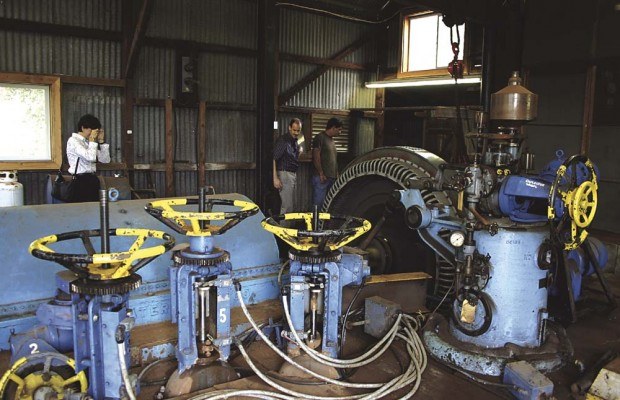LIHU‘E — Kaua‘i Island Utility Cooperative announced this week it has defined the standards it will use in determining whether small-scale hydroelectric projects are feasible for Kaua‘i. “Since the beginning of this process, we have emphasized that we are at
LIHU‘E — Kaua‘i Island Utility Cooperative announced this week it has defined the standards it will use in determining whether small-scale hydroelectric projects are feasible for Kaua‘i.
“Since the beginning of this process, we have emphasized that we are at the beginning of a long, comprehensive process that will involve all stakeholders at many points along the way,” KIUC spokeswoman Anne Barnes said. “This resolution formalized that sentiment, and put KIUC officially on the record as unequivocally committed to a process that is orderly, fair, comprehensive, accessible and transparent.”
Board members, during a special meeting Monday morning, unanimously approved a resolution comprised of requirements that make hydroelectric an inclusive process of community engagement and acknowledge certain stakeholders.
“KIUC recognizes that the island’s urgent need to reduce its reliance on fossil fuel-based power must be balanced with cultural, diversified agricultural, fishing, hunting, recreational and tourism interests in order for any project to be successful,” KIUC CEO David Bissell said in a statement. “We are beginning a long period of gathering the input, concerns and ideas of all interested parties to make certain that balance is achieved.”
Bissell said eight hydroelectric facilities have been operating on Kaua‘i since the early 20th century, a legacy of the infrastructure relied upon by the sugar plantation operators.
“The board and staff of KIUC, and Free Flow Power on behalf of KIUC, do not know today if new, small hydro is possible on Kaua‘i as part of the portfolio of renewables, but we all are committed to a three-plus year process that, with the community’s involvement, will tell us whether it is, or not,” he said.
KIUC performed no community outreach prior to contracting with energy developer Free Flow Power to file Federal Energy Regulatory Commission applications for preliminary permits to explore hydropower development on six Kaua‘i waterways.
FERC preliminary permits allow a developer exclusive rights to explore the viability of an energy resource prior to development.
Bissell said the co-op did not wish to publicly announce its intent to file permit applications out of concern that outside energy developers would also try file permit applications for the same resources and squeeze KIUC out.
Now, with two of the six permit requests approved, KIUC is ready to reach out to the community for feedback.
“Of all the potential renewable technologies, hydroelectric power looks at this point to be the lowest cost and long-term best value for KIUC’s members,” Bissell said, adding that hydropower projects last essentially forever, using technology that has changed little in more than 100 years.
“If proved feasible, hydropower projects that also support diversified agricultural development could be the most important investment KIUC can ever make to benefit island residents,” he said.
The Monday morning special meeting was open for the public to attend and offered an opportunity for public comment. But KIUC gave little more than 48-hours notice to the public that the meeting would be held.
“Per our standard procedure for all board meetings, a notice was placed on our website at approximately 8:45 a.m. on Saturday, April 16,” KIUC spokeswoman Anne Barnes said, “and posted at all staffed KIUC facilities.” KIUC’s publicly accessible facilities are not open or staffed on weekends.
“The bylaws provide for noticing a special meeting of the board on at least 24-hours notice,” Barnes said. “The meeting was held at 11:30 a.m. on Monday, April 18th, thus providing more than twice the minimum 24-hours notice.”
Board member Jan TenBruggencate was off island for a family funeral and did not attend the special meeting.
When asked why the board chose to convene a special meeting for the resolution, considering the next regular board meeting is scheduled for next week, KIUC Board Chair T. Phil Tacbian said the board wanted to show its support for hydro development before the series of first-quarter member meetings began. KIUC held the first of three member-meetings on Monday evening in Waimea.
Additional KIUC first-quarter meetings were held on Tuesday evening in Lihu‘e and on Wednesday evening in Kilauea. All meetings featured a presentation by Bissell on alternative energy options for Kaua‘i. Free Flow Power Vice President of Project Development Jason Hines spoke about hydroelectricity.
For details about the Kilauea meeting, check an upcoming edition of The Garden Island.
Resolution 03-11 says KIUC employees and staff, through thedirection of KIUC and employees of Free Flow Power Corporation,shall explore the desirability and construction of a new orexpansion of existing hydroelectric facilities in manner that shallalways:
• Recognize the importance of the cultural, diversifiedagricultural, hunting, fishing, tourism and recreational use ofwatershed resources and that stream flows shall be diverted only insuch a way as to address the legitimacy and priority of resources;and that only remaining water flows, after such issues have beenaddressed, shall be considered for hydroelectric generation.
• Recognize that sufficient stream flow must be maintained from thepoint of any diversion to the return of water to the sourcewaterway that ensures adequate habitat for affected aquatic andterrestrial species.
• Require KIUC to consult with and obtain direct input from any andall interested parties through appropriate and effective forumsprior to the initial design of any hydroelectric project.
• Require KIUC to establish a mechanism for members to submitwritten questions regarding the possibility of hydroelectricdevelopment and the process of such development evaluation; andthat the co-op provide answers on its website.
• Once a hydroelectric project is designed, KIUC will be requiredto continue to meet with and solicit the direct input of allinterested parties through appropriate and effective forums toconsider whether modifications are needed.
• Recognize that the objective community and stakeholders’involvement may require meetings, forums and other feedbackmechanisms that exceed the requirements of governmental bodies.


